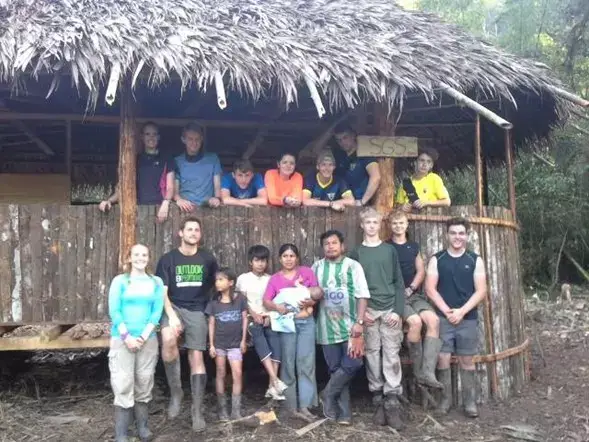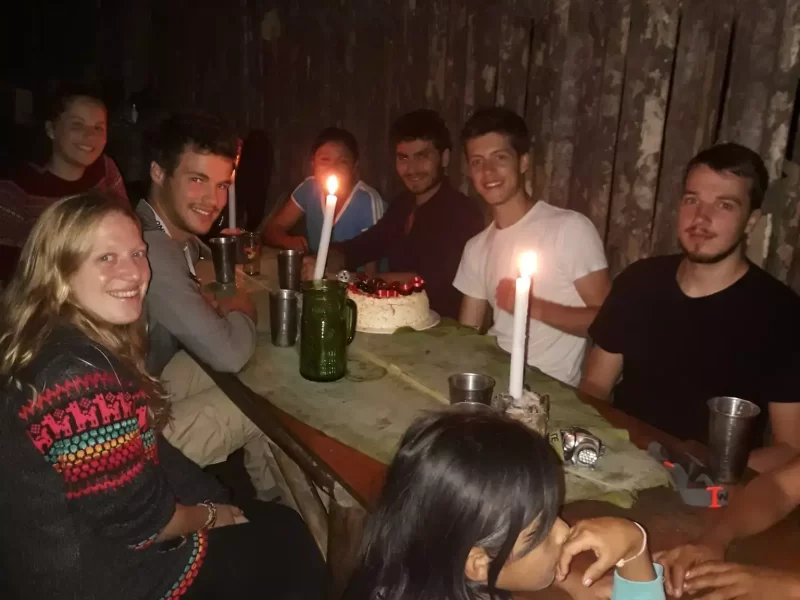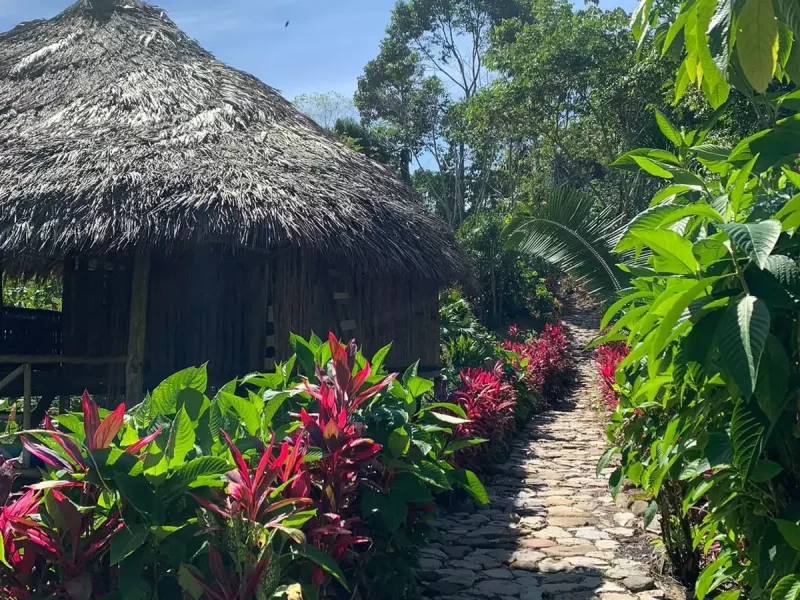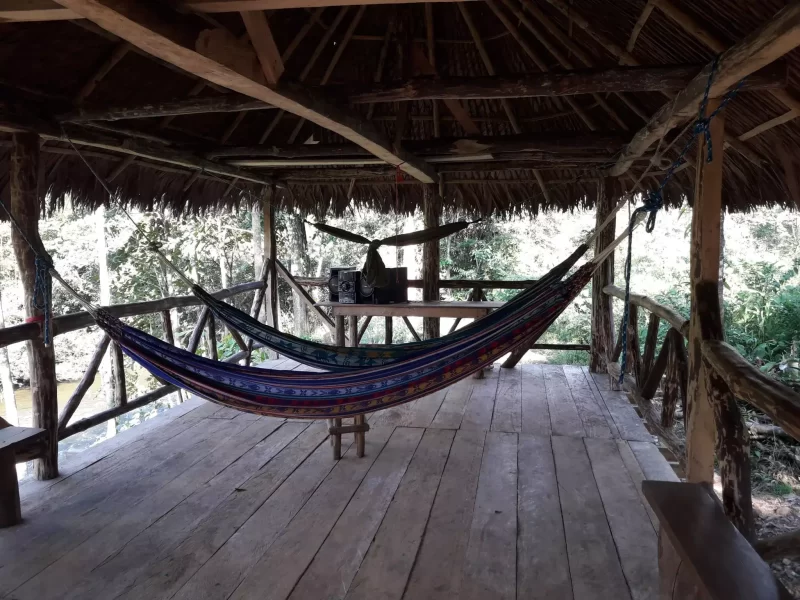WHY we need you in Ecuador
- Ecuador has been grappling with deforestation, particularly in its Amazon rainforest regions. The rate of deforestation has varied over the years, with periods of increased forest loss due to activities such as logging, agriculture expansion, and oil exploration.
- Deforestation in Ecuador has significant environmental consequences, including habitat loss for numerous species, increased greenhouse gas emissions, and disruption of local ecosystems.
- Ecuador continues to face challenges related to poverty. The poverty rate in the country fluctuates, but a significant portion of the population lives below the poverty line.
- Limited access to quality education and healthcare services can hinder social mobility and contribute to the cycle of poverty for many Ecuadorians.
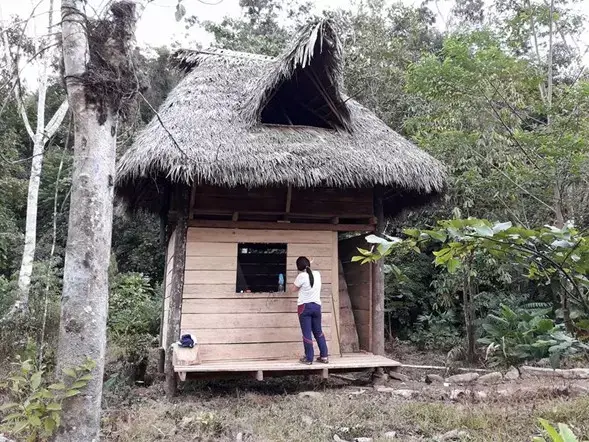
HOW can you help?
- Assist in reforestation and agriculture inititives
- Basic English clases in school times
- Community development work
- Learn more about jungle conservation.
WHAT can you do?
- Path cleaning
- Construction of houses and latrines
- Adapt to the environment and go with an open mind
- Help preserve the biodiversity and the natural resources
Why Involvement Volunteers International?
- Non Profit Org & Charity with 35+ Years Experience
- Amazing Projects to Choose From in Ecuador
- Social Experiences - Sharing with International Volunteers
- Excellent Safety Record, In-Country 24/7 Support & Emergency Assistance
- 1 Application Fee - Multiple Countries

PROJECT NAME: JUNGLE CONSERVATION
LOCATION: MORONA SANTIAGO
START DATES: WEEKLY (2nd Jan to 22nd Dec)
ACCOMMODATION: VOLUNTEER HOUSE
MIN DURATION: 1 WEEK
MIN AGE: 18+
SPECIAL REQUIREMENTS: Spanish is necessary
Overview
The jungle project is an ongoing initiative that operates throughout the year, running from January 2nd to December 22nd annually. The primary goal is to safeguard biodiversity and natural resources in collaboration with local residents, ensuring the well-being of both present and future generations.
This program is tailored for genuine nature enthusiasts seeking an eco-adventure and who are open to embracing the modest accommodations provided within the project. Volunteers will have the unique opportunity to immerse themselves in the jungle environment, gain insights into the traditions and practices of the Shuar culture, all while contributing to nearby schools and engaging in community efforts. These activities include house and latrine construction, machete-assisted trail maintenance, reforestation, agricultural projects, and afternoon sessions dedicated to crafting.
Facilities on this placement can be basic, no water, phones, wifi, or electricity! This can be a challenge but all part of the experience!
Location
The program is located 2.5 hours from Macas the capital city of the Province Morona Santiago, where you can find electricity, water, internet, hospital, banks, bus terminals, etc. The project is situated within the Morona Santiago Province, in the Amazon region of Ecuador. This initiative is an integral component of the protected area known as Forest Kutukú-Shaimi, which is under the jurisdiction of the Shuar indigenous community.
Project Tasks
- House and latrine construction
- Machete-assisted trail maintenance
- Reforestation
- Agricultural projects
- Afternoon sessions dedicated to crafting
Food & Accommodation
Upon arrival in Quito, volunteers are required to visit the main house to receive essential safety guidelines and receive information about the country. Accommodation is provided in the main house, where you will stay in dormitories with 1-4 people per room. Typically, you will spend 1-2 days in Quito, dependent on your arrival schedule.
The accommodation on the jungle project will be in modest cabins. The bathroom facilities consist of latrines/ dry toilets. There is no water, so you will shower in the waterfall of the river! You can also hand wash your clothes in the waterfall. There is no electricity, wifi or phones. You may be able to charge phones or get wifi at the local school but this cannot be guaranteed.
You will receive 3 meals a day. The food will be local Ecuadorian cuisine, vegetarians are welcome but we are not able to cover vegans needs, because they are very strict. Vegetarianism and veganism are not part of the Ecuadorian culture.
Conservation
Projects
- Jungle Conservation
-
1 Week - $300
-
2 Weeks - $400
-
3 Weeks - $500
-
4 Weeks - $600
-
6 Weeks - $650
-
8 Weeks - $1100
-
12 Weeks - $1600
-
4 Months - $2100
-
5 Months - $2600
-
6 Months - $3100
What's Included
-
Accommodation
-
Meals
-
1 Day Orientation
-
24/7 In-Country Support
-
Project Materials & Equipment
-
Pre-departure Expert Advice
-
Preperation Tools & Checklists
-
Certificate of Completion
- Application fee is one off per person (unlimited placements)
- Click Here to convert the below prices to your local currency
- Discounts may apply if travelling in a pair or group!
- All credit card /international fees included in below pricing! 🙂
FAQ
Volunteers should have a real passion for the environment, do not mind putting in the hard work and are comfortable with very basic facilities, as this is an off-grid program!
- Accommodation
- 3 meals p/day & 2 p/day at weekends
- 1 day orientation
- In country 24/7 support & emergency assistance
- Fundraising support
- University course credits (where applicable)
- Certificate of Completion
- Airfares
- Travel Insurance
- Transportation
- Tours, Souvenirs & spending money
Individual volunteers are provided with essential information encompassing safety guidelines, the political landscape in Ecuador, strategies for addressing challenges, and pertinent tourist details. The orientation takes around 2-3 hours to ensure individual volunteers are well-prepared. For groups or long-term volunteers, we extend this orientation to a more extensive 2-3-day program, as they also need time to facilitate the visa legalisation process.
*No transportation is included
Volunteers normally arrive to Quito (this cost is not included but a taxi can be booked for you). The official cost is 30 dollars, and it takes around 1 hour.
Once arrived, you will get instructions about safety rules, political situation of the country, how to get to the project, etc. You will likely spend one night in the foundation house in Quito, and the next day after breakfast, be accompanied by someone of the organisation to the bus terminal to take the correct bus. The taxi ride to go to the bus terminal, costs around 5 dollars, and it takes 20 minutes.
The bus to Quito- Macas 8 hours the cost is 16.50 dollars during the day. In Macas it is necessary to take another bus to Selva y Vida for 2.5 hours the cost is 3 dollars. There is a direct bus Quito- Selva y Vida the cost is 16.50 but is possible only during the night .
Monday to Friday. 08:30-12:30 and 14:30-16:30. Weekends off.
During the school period (September to June) volunteers will assist with basic English classes in the mornings and continue for another couple of hours on the jungle project n the afternoons. This can vary though.
Activities:
- Reforestation and agriculture.
- Community work
- Construction of houses and latrines.
- Path cleaning
- Initiatives from the volunteers to the development of the community.
- During the school period (September to June) volunteers will assist with
- basic English classes.
Here are some must-visit places and things to do in this beautiful country:
Explore the Galápagos Islands: Discover the unique wildlife, pristine beaches, and extraordinary marine life of this UNESCO World Heritage site through snorkelling, diving, or guided tours.
Visit Quito’s Historic Centre: Wander through Quito’s well-preserved colonial old town, a UNESCO World Heritage site, and explore its churches, plazas, and museums.
Hike in the Andes: Embark on a trek through the Andean highlands, visiting iconic spots like Cotopaxi National Park, Quilotoa Crater Lake, and the scenic town of Banos.
Amazon Rainforest Adventures: Explore the Amazon Basin, go wildlife spotting, visit indigenous communities, and take a canoe ride along the Amazon River.
Climb Cotopaxi Volcano: For the adventurous, attempt to summit Cotopaxi, one of the world’s highest active volcanoes.
Relax in the Thermal Baths of Banos: Soak in the natural hot springs in the town of Banos, surrounded by lush rainforest.
Discover Cuenca: Explore the charming city of Cuenca, known for its well-preserved colonial architecture, art galleries, and rich cultural heritage.
Experience the Otavalo Market: Visit the famous Otavalo market, one of South America’s largest indigenous markets, to shop for textiles, handicrafts, and local produce.
Whale Watching: Head to the coastal town of Puerto Lopez for a chance to witness humpback whales during their migratory season.
Visit the Ingapirca Ruins: Explore the ancient Inca ruins at Ingapirca, Ecuador’s largest archaeological site.
Chocolate Tour: Take a tour of a cacao plantation and learn about the chocolate-making process, from bean to bar.
Attend a Festival: Experience Ecuador’s vibrant culture by participating in local festivals and celebrations, such as Inti Raymi or the Diablada.
Bird Watching: Ecuador is a paradise for bird enthusiasts. Consider birdwatching in the cloud forests of Mindo or in the Yasuni National Park.
Ride the Devil’s Nose Train: Take a thrilling ride on the Devil’s Nose Train, an engineering marvel that traverses steep slopes and offers breathtaking views.
Relax on the Pacific Coast: Enjoy the sun, surf, and seafood on the beautiful beaches of Ecuador’s Pacific Coast.
You must be over 18 years old and a min of 12 weeks is required for this program.
Ecuador, situated in the northwestern part of South America, is a country of remarkable geographical and cultural diversity. It is bordered by Colombia to the north, Peru to the south and east, and the Pacific Ocean to the west. Ecuador’s landscape is exceptionally varied, encompassing the towering Andes Mountains, dense Amazon rainforests, and the world-famous Galápagos Islands.
Its capital, Quito, is one of the highest capital cities in the world and is renowned for its well-preserved colonial old town, a UNESCO World Heritage site. The country is celebrated for its indigenous heritage, with numerous indigenous communities inhabiting different regions.
Ecuador’s economy relies on sectors like oil production, agriculture, and tourism, which thrives thanks to its unique natural wonders and vibrant cultural traditions. This nation, despite its relatively small size, offers an incredible diversity of experiences, making it a compelling destination for travellers and a place of significant cultural and ecological importance.
The country’s climate can generally be categorized into four main zones:
- Coastal Zone (Costa): The coastal region of Ecuador has a tropical and humid climate with two distinct seasons. The wet season, from December to May, brings warm temperatures and heavy rainfall, while the dry season, from June to November, is characterized by cooler temperatures and lower precipitation.
- Andean Highlands (Sierra): The Andean highlands, where many major cities like Quito and Cuenca are located, have a more temperate climate. The weather varies with altitude, but in general, it can be cool to mild during the day and colder at night. Rainfall is distributed throughout the year, with slightly wetter months from October to May.
- Amazon Rainforest (Oriente): The Amazon basin in eastern Ecuador experiences a tropical rainforest climate, characterized by high temperatures and significant rainfall throughout the year. This region has high humidity and lush vegetation.
- Galápagos Islands: The Galápagos Islands, located in the Pacific Ocean, have a unique climate. The islands experience a warm and dry season from June to December and a hot and wet season from January to June. The water temperatures are influenced by ocean currents and vary, making it suitable for diverse marine life.
Ecuador’s cultural landscape is a tapestry woven from the threads of indigenous heritage, mestizo influences, and Afro-Ecuadorian traditions. Indigenous communities, such as the Quechua and Shuar, maintain their distinct customs, clothing, and rituals, enriching the nation’s cultural fabric.
The mestizo majority reflects a fusion of indigenous traditions and Spanish elements, evident in art, cuisine, and everyday life. Afro-Ecuadorian culture, notably prevalent along the coast, contributes its unique music, dance, and culinary delights to the mosaic. Religion, primarily Roman Catholicism, deeply influences Ecuadorian culture, blending indigenous practices with Catholic celebrations.
The country’s vibrant festivals, such as Inti Raymi and regional fiestas like Carnaval, showcase lively parades, music, and dance. Ecuador’s cuisine is a reflection of its diverse regions, offering seafood delicacies on the coast, hearty Andean dishes, and Amazonian flavours like maito.
With a rich artisanal tradition, Ecuador is renowned for its textiles, ceramics, and woodwork. Language-wise, Spanish is the official tongue, but indigenous languages like Quechua persist. Beyond its cultural heritage, Ecuador’s commitment to conservation is evident in its natural wonders, particularly the Galápagos Islands, which symbolize both ecological and cultural preservation.
30 Years Non Profit Experience
IVI is an Australian charity & non profit organisation founded in 1989 and is one of the pioneers of overseas volunteering successfully placing over 20,000 volunteers globally.
Affordable Volunteer Travel
We’re not motivated by shareholder profits. Our fees are fully transparent to ensure maximum benefit where it is most needed.
Safe & Responsible Projects
All projects include a dedicated 24/7 in-country management team, operational & risk assessment & overseas support contact. All projects are personally inspected to ensure very high quality.
Work Experience & University Credits
We place thousands of Uni students and can assist you with course credits and in-field experience points. Many of our project coordinators are qualified practitioners in their respective fields allowing unique in-field supervision and Uni accreditation options
Check out this amazing blog with step by step info on how to raise funds for your overseas volunteer experience to help maximize your impact abroad. Guide to Fundraising
Weekends & Extra Tours
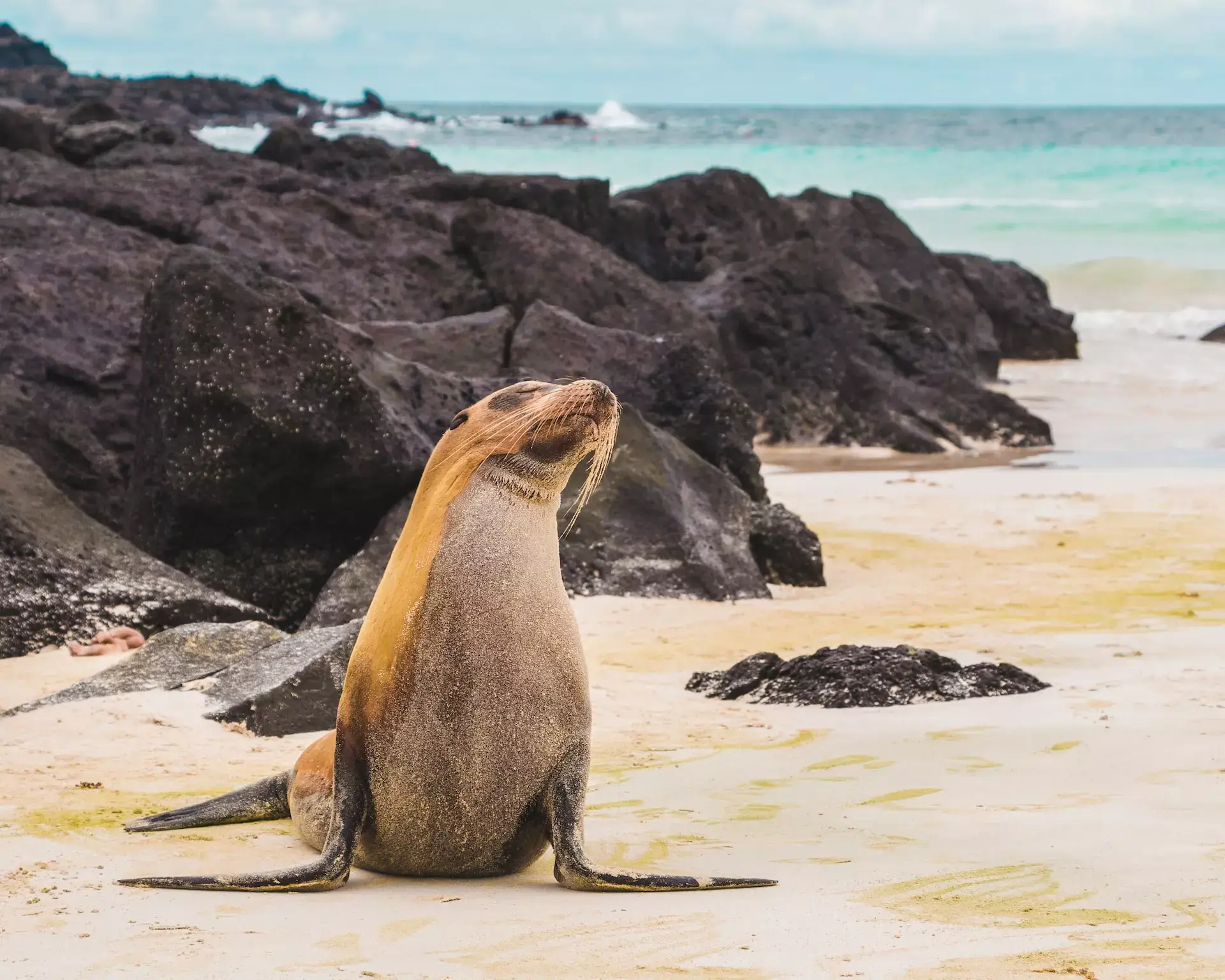
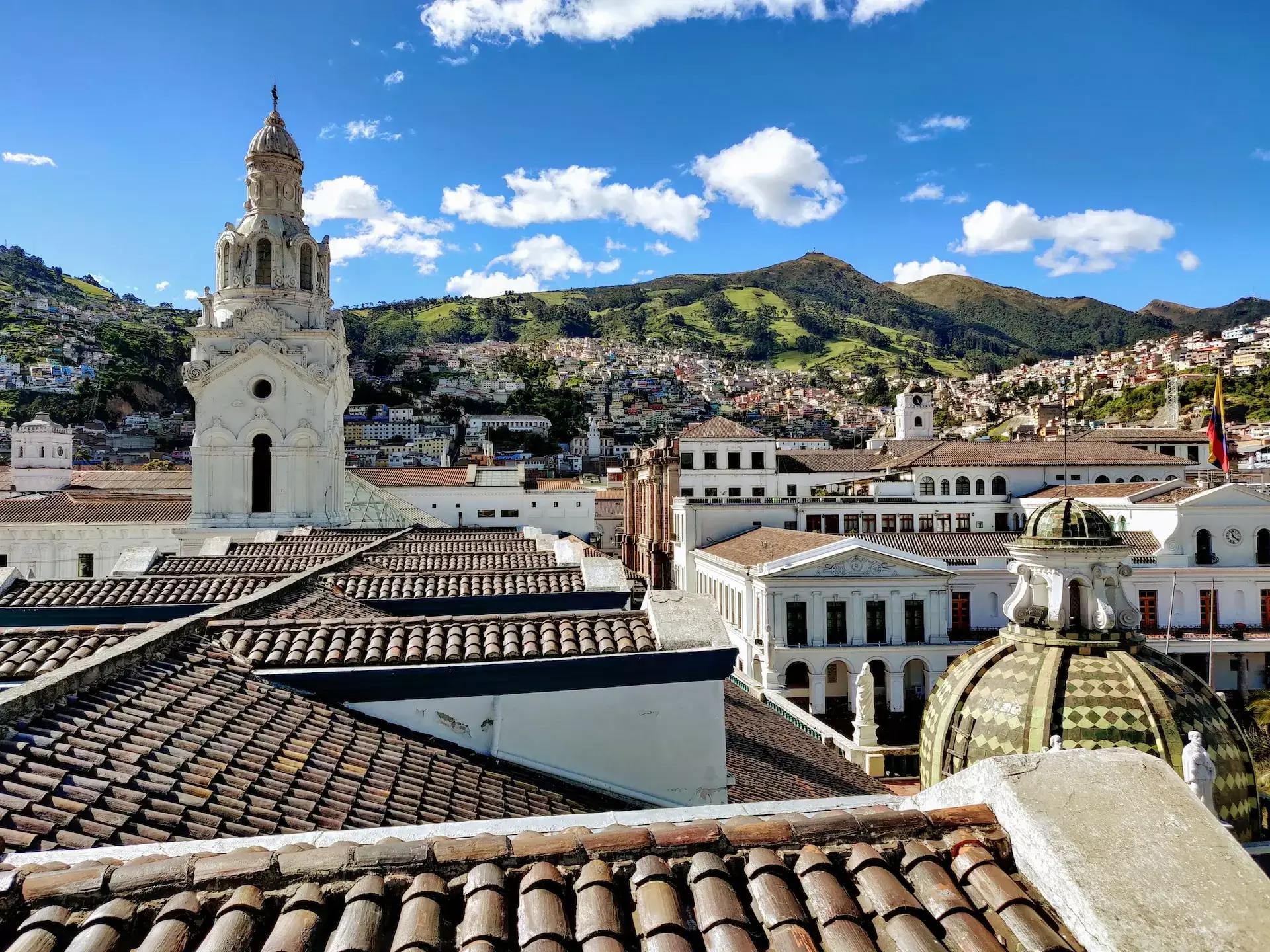

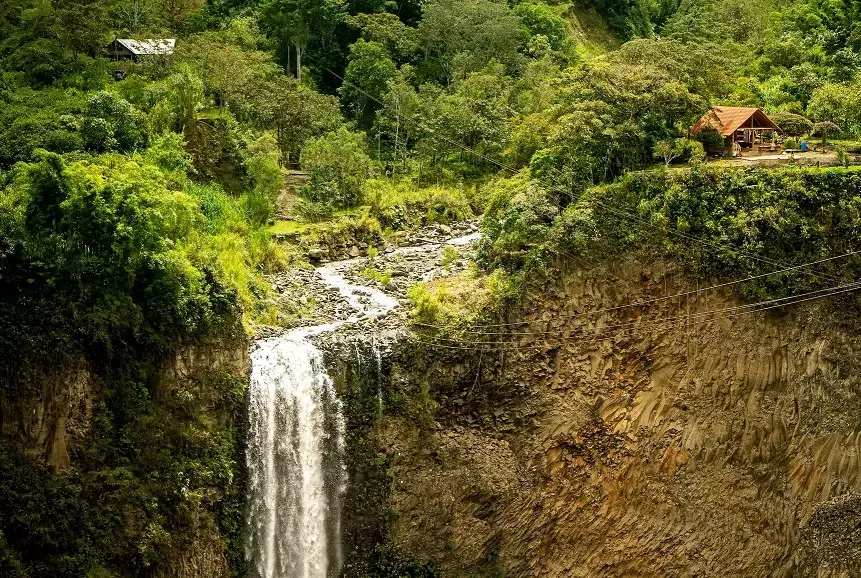
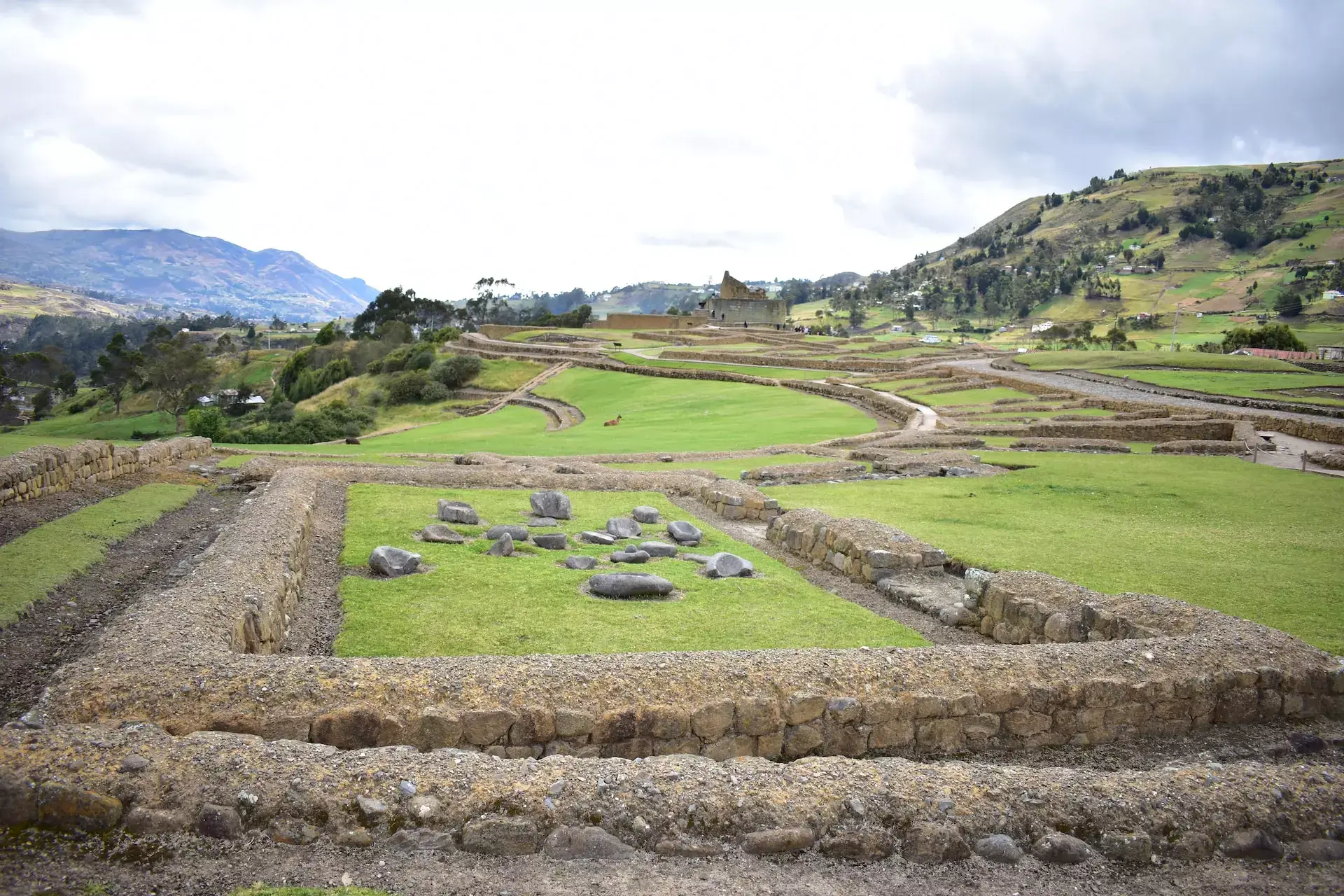
 Involvement Volunteers International
Involvement Volunteers International 

